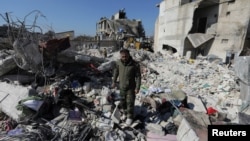ຈຳນວນຜູ້ເສຍຊີວິດໂຮມເຂົ້າກັນທັງໝົດຢູ່ໃນເທິີກີ ແລະຊີເຣຍ ຈາກແຜ່ນດິນໄຫວຂະໜາດແຮງໃນອາທິດແລ້ວ ບັດນີ້ໄດ້ເພີ້ມຂຶ້ນເປັນຫຼາຍກວ່າ 41,000 ຄົນ ແຕ່ກໍຍັງມີຜູ້ຄົນໃນຈຳນວນເລັກນ້ອຍທີ່ຖືກຊ່ອຍອອກມາຈາກຊາກຫັກພັງ.
ໃນວັນພຸດວານນີ້ ແມ່ຍິງສອງຄົນໄດ້ຖືດືງອອກມາຈາກຊາກຫັກພັງ ຢູ່ເມືອງກາຣາມັນມາຣາ ທາງພາກໃຕ້ຂອງເທີກີ ແລະແມ່ຄົນນຶ່ງ ແລະເດັກນ້ອຍສອງຄົນໄດ້ຖືກກູ້ອອກມາ ຢູ່ເມືອງອັງຕາກຢາ ເກົ້າມື້ຫລັງຈາກໄດ້ເກີດແຜ່ນດິນໄຫວ. ການກູ້ໄພຢູ່ອັງຕາກຢາ ໄດ້ມີຂຶ້ນ 228 ຊົ່ວໂມງ ຫລັງຈາກເກີດແຜ່ນດິນໄຫວ ອີງຕາມລາຍງານຂອງອົງການຂ່າວທາງການ ອານາໂດລູ.
ຫລາຍລ້ານຄົນຜູ້ທີ່ລອດຊີວິດຈາກແຜ່ນດິນໄຫວ ຕ້ອງການຄວາມຊ່ວຍເຫລືອດ້ານມະນຸດສະທຳ ທີ່ພວກເຈົ້າໜ້າທີ່ໄດ້ກ່າວ ພ້ອມດ້ວຍຜູ້ລອດຊີວິດຫລາຍໆຄົນບໍ່ມີທີ່ຢູ່ອາໄສ ຢູ່ໃນສະພາບອາກາດທີ່ເກືອບແຂງກະດ້າງຂອງລະດູໜາວ. ການກູ້ໄພບັດນີ້ແມ່ນໄດ້ຫລຸດລົງ ແລະເກືອບຊອກບໍ່ຫາບໍ່ເຫັນ.
ພື້ນຖານໂຄງລ່າງທາງດ້ານສຸຂາພິບານຢູ່ໃນຂົງເຂດໄດ້ຖືກທຳລາຍ ຫລືຢູ່ໃນສະພາບທີ່ໃຊ້ການບໍ່ໄດ້ ຈາກແຜ່ນດິນໄຫວ ພວກເຈົ້າໜ້າທີ່ສາທາລະນະສຸກ ປະເຊີນໜ້າ ກັບວຽກງານທີ່ຍາກລຳບາກ ໃນຄວາມພະຍາຍາມຄ້ຳປະກັນວ່າ ບັດນີ້ຜູ້ຄົນແມ່ນຢູ່ໃນສະພາບທີ່ປາສະຈາກການລະບາຂອງພະຍາດ.
ທ່ານນາງເມີຢານາ ສະໂປຈາຣິກ ເອກເກີ ປະທານຄະນະກຳມະການສະພາກາ ແດງສາກົນ ກ່າວວ່າ ຄົນທີ່ຢູ່ໃນປະເທດຊີເຣຍທີ່ພວມປະສົບກັບໄພສົງຄາມປະ ເຊີນໜ້າກັບການທ້າທາຍໃໝ່.
ຫລັງຈາກຢ້ຽມຢາມຊີເຣຍ ໃນສອງສາມມື້ທີ່ຜ່ານມາ ທ່ານນາງກ່າວ ຢູ່ໃນຖະແຫລງການວ່າ “ຫລາຍກວ່ານຶ່ງທົດສະວັດ ປະຊາຊົນຢູ່ທົ່ວຊິເຣຍໄດ້ປະສົບກັບບັນຫາຂັດແຍ້ງດ້ວຍກຳລັງອາວຸດ. ເວລາແຜ່ນດິນໄຫວເກີດຂຶ້ນ ຢູ່ໃນຂົງເຂດ ເມື່ອວັນທີ 6 ກຸມພາ ບັນດາປະຊາຄົມໄດ້ຮັບຄວາມທຸກທໍລະມານເພິ້ມຂຶ້ນເປັນລຳດັບ ບໍ່ສຳຄັນເລີຍວ່າເຂົາເຈົ້າໄດ້ຢູ່ທາງແນວໜ້າຂອງຝ່າຍໃດ. ບັນດາຄອບຄົວ ແລະໝູ່ເພື່ອນໄດ້ເສຍຊີວິດ ເຮືອນຊານຖືກທຳລາຍ ແລະຄົນບໍ່ມີທີ່ຢູ່ອາໄສອີກເທື່ອນຶ່ງ. ການປິ່ນປົວ ນ້ຳກິນທີ່ສະອາດ ແລະແຫລ່ງສະບຽງອາຫານທີ່ໜ້າເຊື່ອຖື ໄດ້ກາຍມາເປັນສິ່ງສຳຄັນໃນທັນທີເພື່ອຄວາມຢູ່ລອດ.”
The combined death toll in Turkey and Syria from last week’s powerful earthquake has now risen above 41,000, but a handful of people are still being rescued from the rubble.
On Wednesday, two women were pulled from the debris in Turkey's southern city of Kahramanmaras, and a mother and two children were rescued in Antakya nine days after the earthquake. The rescue in Antakya came 228 hours after the earthquake, state-owned Anadolu news agency reported.
Millions of people who survived the quake need humanitarian aid, authorities say, with many survivors left homeless in near-freezing winter temperatures. Rescues are now few and far between.
With much of the region's sanitation infrastructure damaged or rendered inoperable by the earthquakes, health authorities are facing a daunting task in trying to ensure that people now remain disease-free.
Mirjana Spoljaric Egger, president of the International Committee of the Red Cross, said people in war-torn Syria also face new challenges.
After visiting Syria in the last few days, she said in a statement, “For more than a decade, people across Syria have experienced the devastation of armed conflict. When the 6 February earthquake struck the region, communities suffered dramatic levels of devastation no matter what side of the frontline they were on. Family and friends were killed, homes were destroyed, and people were displaced yet again. Medical care, safe drinking water, and reliable food supply sources immediately became crucial to survival.”




